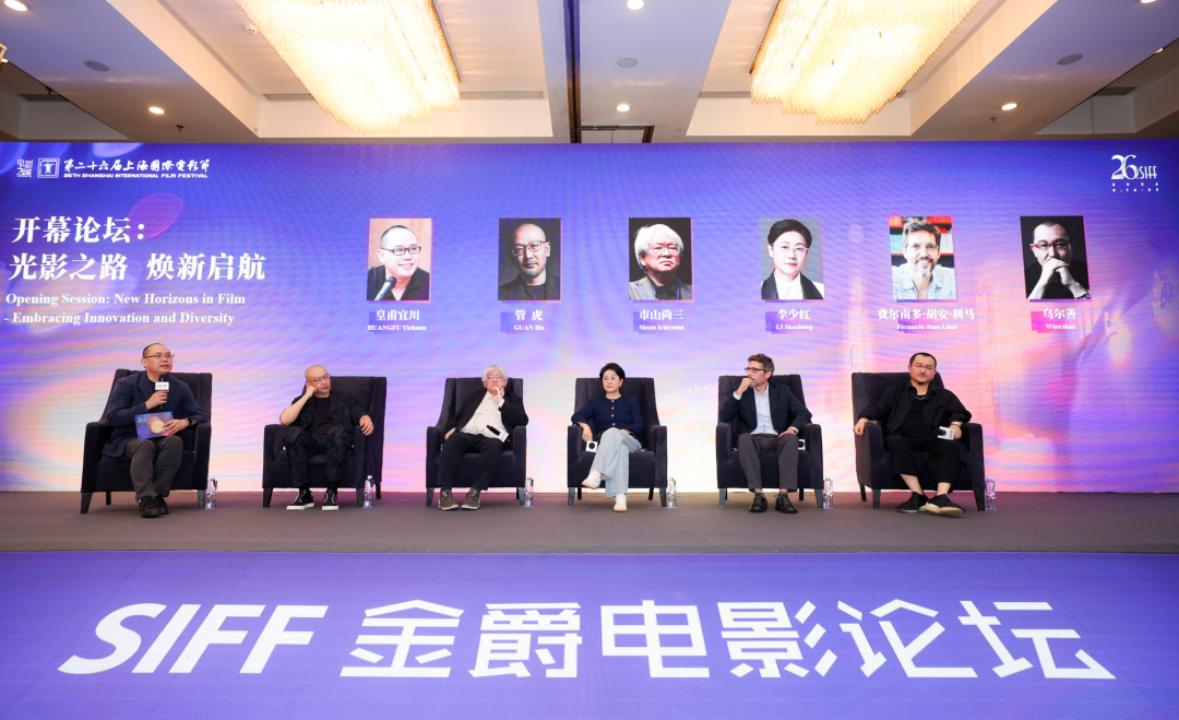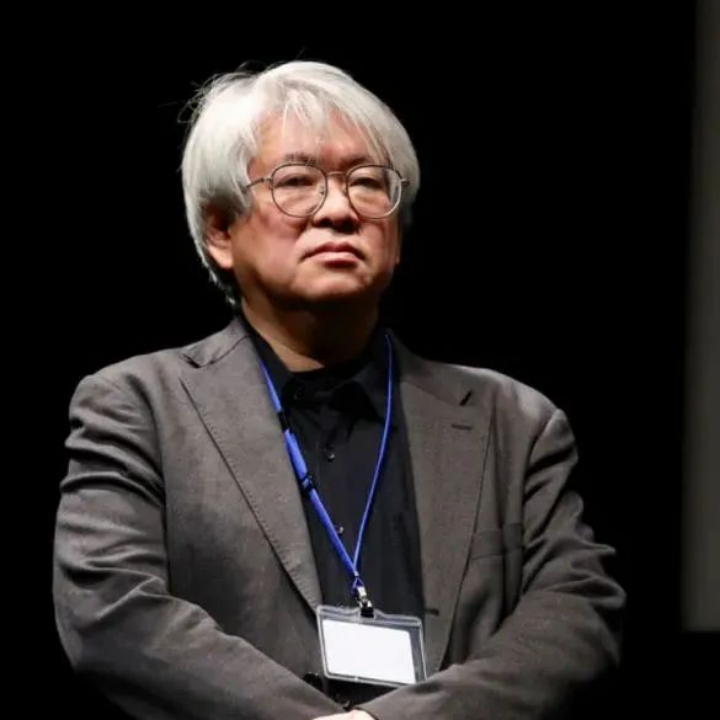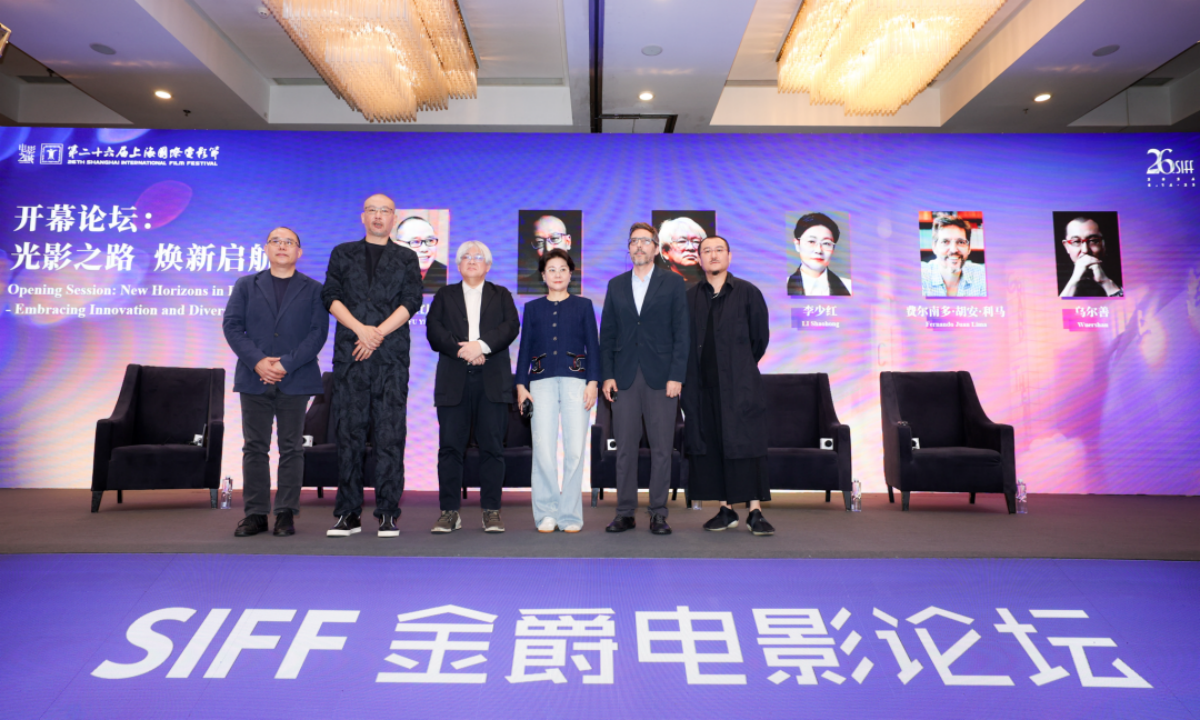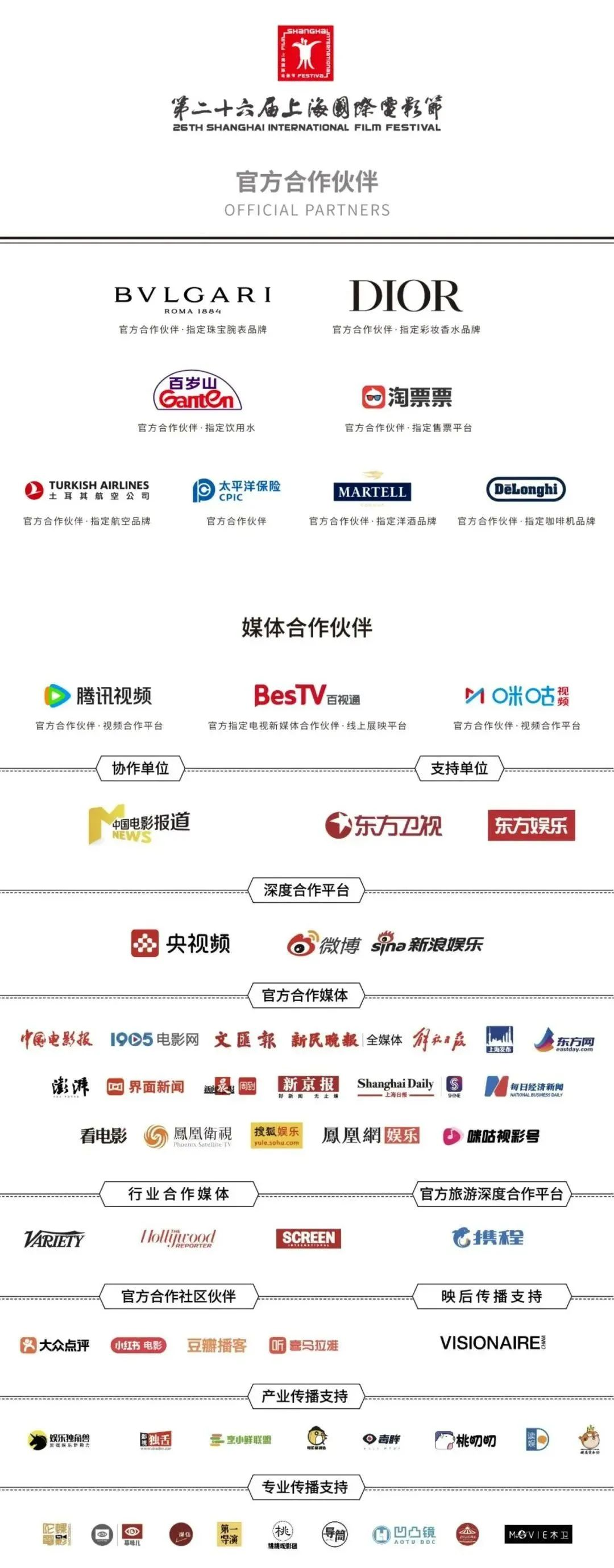SIFFORUM | To Venture Out with Sincerely Made Chinese Cinema
In recent years, the Chinese film market has exhibited a new look and vitality, reflecting not only the current audience’s pursuit of and expectations for film quality, but also showcasing the perseverance and efforts of Chinese filmmakers. This morning, SIFFORUM’s opening session at the 26th Shanghai International Film Festival, titled “New Horizons in Film-Embracing Innovation and Diversity”, gathered leaders from domestic and international film enterprises alongside renowned figures in cinema. The session even aims to foster sustained high-quality development in China’s film industry, forge new international cooperation frameworks, and strategize for the future.
Roundtable One:
Drive high-quality development with new productive forces

The first roundtable talk, themed “Drive High-Quality Development with New Productive Forces”, featured industry leaders from Alibaba Pictures, Bona Film Group, Enlight Media, CMC Pictures, Shanghai Film Group, and IMAX China. They discussed the challenges and opportunities facing the current development of Chinese cinema from their own observations and corporate practices.

Li Jie
President of Alibaba Pictures
The audience’s values and aesthetic changes are on short cycles, whereas film production operates on longer cycles. In this conflict of timelines, we need films that can truly withstand these cycles. I believe there are mainly three types: films with a sense of quality, big-budget industrial films, and those connected to individual destinies, national sentiments, and contemporary resonances. Moreover, for a broader Chinese film market, audiences should be able to select good films of various types, cultures, and expressions from around the world. These works should be helpful in cultivating a passion for cinema among viewers. In the next five to ten years, the Chinese film industry must exhibit greater determination and investment to reap larger rewards.

Daniel Manwaring
CEO of IMAX China
Seeking diverse content will be a crucial aspect of the future film market. Previously, we broadcast NBA games in some cinemas in Hong Kong and Taiwan, all of which were sold out. Surprisingly, 80% of the audience hadn’t visited cinemas in three years, but this event brought them back to experience the theater’s stunning impact. Next time, they may also choose to go to a theater and experience charm of light and shadow on the big screen. The collaboration with Alibaba Pictures last year on Taylor Swift’s concert film was also a very successful case. Therefore, we aim to promote the development of diverse content to attract audiences who haven’t experienced the magic of cinema for a long time, bringing them back to the theaters.

Wang Changtian
Chairman of Enlight Media
Currently, the market share structure of domestic film genres in China is not entirely rational. For instance, animated and science fiction films have disproportionately low shares of total box office earnings. In the United States, animated films hold 15% to 20% of the market, but in China, it’s only 7-8%, and sometimes even less than 5%. The same goes for science fiction, where there are too few products like THE WANDERING EARTH. We are jointly developing a film adaptation of the THREE-BODY with the Three-Body Universe, which is in early pre-production and will be directed by Zhang Yimou. We hope Zhang Yimou can capture the essence of the novel and achieve breakthroughs and innovations that resonate internationally. Regarding the relationship between commerce and art, for a film company, survival and growth are primary. Without commercial films, it’s difficult for a company to survive and expand. However, once established, a company can support artistic films or innovative works. Thus, using commerce to support art, and then using art to promote commerce, means using artistic innovation or films to win better audience reception, to expand the expressive space of Chinese cinema. This is something we should focus on as we continue to develop.

Wang Jian’er
Vice Chairman of China Film Association, Secretary of the Party Committee and Chairman of Shanghai Film Group, Secretary of the Party Committee and Chairman of Shanghai Film Co., Ltd.
Relying solely on box office revenue for the sustained development of China’s film and television industry, I find it challenging. This approach lacks consistency. The ultimate solution lies in strengthening IP development. IPs possess the ability to cross boundaries, integrate, and collaborate with various commercial brands, breaking down industry barriers and significantly broadening our commercial returns. With audiences having abundant choices and content growing richer, and with creators from generation to generation expanding their horizons, we see an overall positive trend. In such circumstances, I believe systematic IP development - from conceptualization to implementation and value assessment - is essential. We need to gradually perfect a well-thought-out plan to guide the healthy development of this industry.

Ying Xujun
Vice President of CMC Inc., President of CMC Pictures, President of Pearl Studio
From both production and distribution perspectives, Chinese cinema needs to venture more globally. It’s crucial for Chinese companies and filmmakers to actively and comprehensively participate in the global circulation of films with an extremely open attitude. For instance, THE MEG series and DECODED represent two different international collaboration models, characterized by equal, free, and open exchanges at all levels, which are key to going global. On the distribution front, we aim to establish a highly effective and comprehensive global distribution network, encompassing not only theatrical releases but also various new media and emerging distribution channels facilitated by new technologies. With the help of modern technology and platforms, we can effectively find and cultivate audiences who appreciate Chinese and Mandarin-language content, thus better achieving the goal of globalizing Chinese cinema.

Yu Dong
Founder, Chairman, and General Manager of Bona Film Group
Film involves commerce, art, technology, and humanities - all are indispensable. Regardless of genre or subject matter, the problems in these aspects must be addressed. Over the past decade, Bona Film Group has focused on producing mainstream films. However, we’ve been exploring and upgrading how to integrate these themes with commercial and genre films, incorporating artistic elements, new technologies, and humanistic stories and sentiments. Looking ahead, we may strive for international expressions in genre films, such as telling stories of Chinese abroad, which remains relatively unexplored in today’s global cinema. Additionally, after achieving profitability in the domestic market, we aim to further expand our influence, reach, and export capabilities in overseas markets. This may be the key for us to transition from a film powerhouse to a strong film nation in the next decade.

Roundtable Two:
Outlook on global markets and international cooperation

The second roundtable talk, themed “Outlook on Global Markets and International Cooperation”, invited five filmmakers from China and abroad to share their perspectives and experiences on how they balance regional cultural characteristics in their creations to evoke emotional resonance among global audiences.

Guan Hu
Director, Screenwriter, Producer
In my creative process, I find that overthinking can sometimes be detrimental. So, I try to keep things simple and listen to the voice inside me, striving to realize it purely. The communicative power of film is inherently primal - it sometimes transcends dialogue, allowing audiences to understand without words. Art - whether it’s in film, music, or painting - unites people across skin color, language, and culture, revealing universal truths about humanity. My expanded perspective has shown me that film's communicative potential is vast, with its sound, visuals, and body language serving as platforms for exchange.

Shozo Ichiyama
Program Director, Tokyo International Film Festival
In recent years, the international market has undergone significant changes. More audiences are willing to embrace films from diverse cultural backgrounds, seeking fresh artistic elements different from those found in their own nation’s cinema. I think it’s a good opportunity for Asian cinema right now. For creators, there’s no need to deliberately target the international market during creation. You simply need to sincerely express your artistic feelings and present the results to the audience. Looking back at successful Chinese films internationally, many of them have showcased breathtaking Chinese landscapes with great artistic sense. However, why do most contemporary Chinese commercial films struggle to succeed globally? Besides scenic beauty, we may need more elements related to family, society, shared emotions, and genuine characters.

Li Shaohong
Director
The language of film itself is international – it’s not just spoken language but a language that represents our minds and worldviews, a language shared universally. Therefore, the purpose of film isn’t just about “going global” but about showcasing and communicating our perspectives on the world. What we can portray are our own selves, our era, and the culture and history of our nation. There’s no need to search deliberately for something; what’s more important is to sincerely and passionately express what we see and think through imagery. As long as your expression is sincere and your story and characters are moving, I believe they will be recognized in international exchanges.

Fernando Juan Lima
Chairman of the Mar del Plata International Film Festival, Argentina
If we approach filmmaking with the sole aim of “going global”, we risk losing the soul of film creation. What’s crucial is that we approach our work with sincerity, giving our all to craft excellent pieces. China possesses a unique perspective and rich cultural heritage, which I believe can pave the way for great success in Chinese cinema. During the creation process, it’s essential to focus inwardly. But when it comes to distribution and screening, contact with major distribution networks is crucial to our successful penetration into the international market.

Wuershan
Director
CREATION OF THE GODS I: KINGDOM OF STORMS will be released in Europe this year, which is a result I hadn’t anticipated. When I embarked on its creation, my goal was to create a mythological epic for Chinese audiences, to rekindle our understanding of our history, culture, and precious spiritual wealth, resonating with Chinese viewers. Human emotions are universal; if we are moved, audiences from different cultures, nations, and regions around the world will be moved as well. Therefore, I haven’t pursued the goal of “going global”. Instead, I’ve aimed to authentically express our current spiritual world, honestly confront our emotional lives, and genuinely tell the stories I wish to share. Consequently, I’m more concerned with finding the “starting point” for our journey outward.



